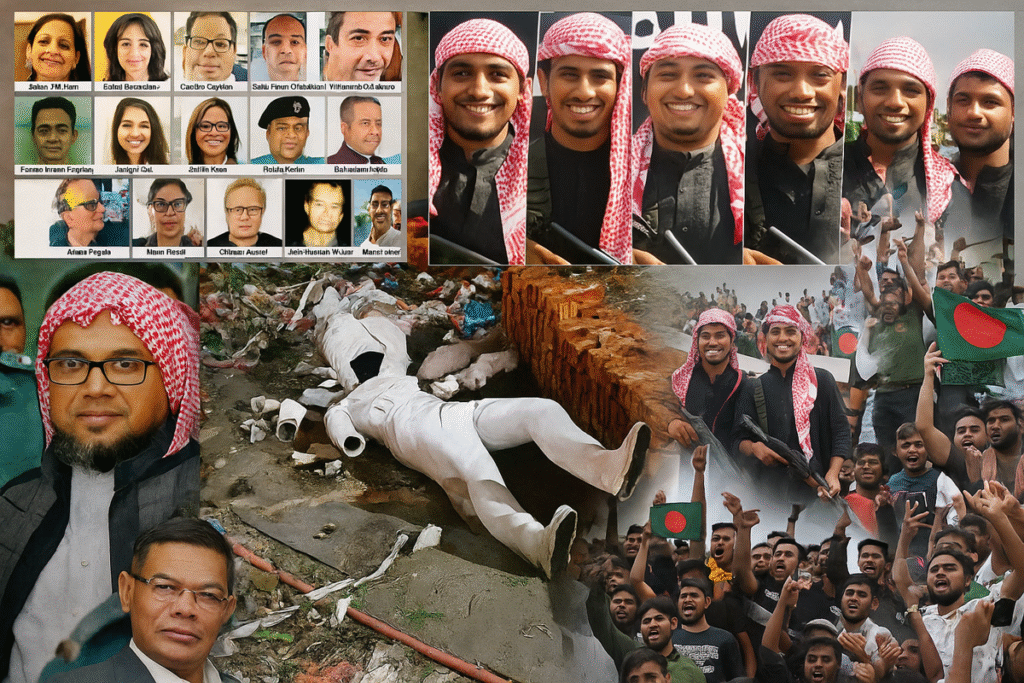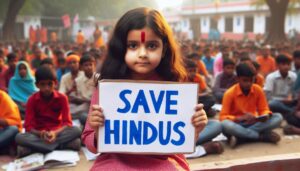A Deadly Legacy: Bangladesh’s Resurgent Terrorism and the Safe Haven for Extremists
Holey Artisan Attack – Bangladesh’s Darkest Night
On the night of July 1, 2016, Bangladesh witnessed its deadliest terrorist attack. Five young militants stormed the Holey Artisan Bakery in Dhaka’s upscale Gulshan district, armed with guns, bombs, and blades. They brutally murdered 22 people – including 17 foreigners (nine Italians, seven Japanese, one Indian) – and two Bangladeshi police officers who rushed to respond. The carnage shook the nation and drew global attention.
The Islamic State (IS) claimed responsibility within hours, though Bangladeshi authorities later attributed the massacre to a homegrown “Neo-JMB” cell. Regardless of affiliation, the Holey Artisan attack was a wake-up call. It exposed the lethal reach of Islamist militancy in Bangladesh and triggered an aggressive counterterror crackdown in the years that followed.
In the immediate aftermath, security forces swept up dozens of suspects, dismantled extremist hideouts, and revamped anti-terror units. An elite Counter Terrorism and Transnational Crime (CTTC) unit within Dhaka Metropolitan Police (DMP) was formed, alongside a dedicated Anti-Terrorism Unit (ATU), to hunt down jihadist networks. These efforts paid off: several planned attacks were foiled, and by 2019 a special tribunal convicted seven militants for aiding the Holey Artisan plot (initially sentencing them to death, later commuted to life terms on appeal). Many other accused militants were killed in raids or fled the country to avoid capture. For a time, Bangladesh’s “zero tolerance” approach seemed to have stemmed the tide of Islamist terrorism.
Crackdown Fallout: Militants in the Diaspora
The purge at home forced numerous Bangladeshi extremists to scatter abroad. Over the next few years, Bangladeshi militant cells began surfacing in foreign lands, often under the guise of migrant labor or expatriate communities. In 2019, Saudi authorities in Dammam uncovered hidden arms among a group of Bangladeshi workers and promptly deported 14 of them on suspicions of jihadist activity. A transnational terror finance ring was exposed in Italy in 2021, where a fake NGO had been funneling money to madrassas controlled by the banned Jamaat-ul-Mujahideen Bangladesh (JMB). And in 2022, Singapore detained and repatriated 26 Bangladeshi nationals accused of plotting violence during Prime Minister Sheikh Hasina’s state visit.
A stark reminder of this globalized militant infrastructure came in mid-2025. In June, Malaysian police arrested 36 Bangladeshi expatriates in a sweeping counterterror operation. Malaysia’s Home Minister Saifuddin Nasution Ismail disclosed that this group had formed “recruitment cells” within the migrant community, indoctrinating others with Islamic State ideology, raising funds for extremist activities, and even plotting to topple the legitimate government in their country of origin (Bangladesh). Five of the arrested men have already been charged under Malaysia’s anti-terror laws, 15 are slated for deportation back to Bangladesh, and the rest remain under investigation. Malaysia – which hosts an estimated half a million Bangladeshi workers – has now become a key hotspot for these militant diaspora networks. Intelligence officials note this is part of a broader trend: JMB and IS-linked operatives are exploiting labor migration routes to spread their reach, targeting vulnerable migrant workers in places like Malaysia, the Middle East, and Europe.
These foreign cases reveal a sobering truth: Bangladesh’s militant problem never truly went away – it simply went offshore. The crackdown at home dispersed the threat, as jihadists sought friendlier ground abroad to fundraise, recruit, and plot. Countries like Saudi Arabia, Italy, Singapore, and now Malaysia have all intercepted Bangladeshi militants on their soil in recent years, underscoring the international dimensions of Bangladesh’s extremism. Far from being isolated incidents, these are interconnected nodes of a transnational terror network loyal to groups like JMB, Ansar al-Islam (Ansarullah Bangla Team), and IS.
The 2024 Upheaval: A “Student” Revolt or Militant Resurgence?
For all its successes against militancy, Sheikh Hasina’s government was not immune to public discontent. By mid-2024, Bangladesh plunged into political turmoil. What began as a student-led protest movement escalated into a full-blown uprising against Hasina’s long incumbency. In what some dubbed the “July-August revolution,” tens of thousands of students and activists took to the streets, and violent clashes erupted. By early August 2024, amid deadly unrest, Prime Minister Hasina was ousted from power and fled the country after 15 years of rule. A military-backed interim government was installed, ostensibly to restore order and oversee new elections.
At face value, this was portrayed as a spontaneous pro-democracy revolt by youths. However, evidence suggests Islamist extremist elements were deeply entwined in the chaos. The so-called student movement appears to have provided cover for jihadist to seek revenge against the Awami League regime that had crushed them. According to Malaysia’s Home Minister, the Bangladeshi militant cell busted in Kuala Lumpur this year was directly involved in agitation aimed at overthrowing the Dhaka government. They had been indoctrinating others and collecting funds specifically to fuel the anti-Hasina campaign from abroad. This hints that the mid-2024 uprising was not purely civic or democratic; rather, it was infiltrated by extremist groups seeking to reinstate a more Islamist-friendly order in Bangladesh.
At home, the upheaval took on a disturbingly militant character. In late July 2024, mobs of protesters besieged prisons in at least five districts, staging coordinated jailbreaks that freed thousands of inmates, including convicted terrorists. In one incident on July 19, hundreds of rioters attacked the Narsingdi jail east of Dhaka, setting it ablaze and releasing hundreds of prisoners. Similar assaults on four other prisons followed, even targeting the high-security Kashimpur facility that held some of the country’s most notorious militants. By the time order was shakily restored, around 2,200 inmates had escaped in the chaos. Months later, authorities admitted roughly 700 escapees were still at large – including about 70 convicted terrorists or death-row militants who simply melted away during the “revolution”. It was a catastrophic security breakdown. The mass jailbreaks not only emptied cells of dangerous extremists but also signaled how emboldened militant networks had become under the guise of political unrest.
The new authorities have since tried to rewrite this narrative. They hail 2024’s events as a people’s triumph over authoritarianism, downplaying any jihadist role. But the facts speak differently. The systematic targeting of prisons to free terrorists was no coincidence – it was a strategic move to re-arm the militant ranks. Indeed, police later said they were monitoring several “top terrorists” who had conveniently been granted bail by courts immediately after Hasina’s ouster. It appears the change of regime opened the floodgates for imprisoned extremists to walk free, whether by force or legal leniency. Far from vanquishing militancy, the 2024 power shift provided it fresh oxygen.
Freed Extremists and Official Denial
One of the most troubling developments of the new regime has been the outright freeing of convicted extremists – and the denial that Bangladesh even has a militancy problem. Case in point: in August 2024, the interim government quietly released Mufti Jashimuddin Rahmani, the notorious chief of Ansarullah Bangla Team (ABT), on bail. Rahmani was serving a prison sentence for inciting the 2013 machete murder of blogger Rajib Haider and faced multiple terrorism charges. Under Sheikh Hasina, ABT (an Al-Qaeda aligned outfit also known as Ansar al-Islam) had been banned and its leaders imprisoned. Yet the post-uprising administration – reportedly influenced by Nobel laureate Dr. Muhammad Yunus as Chief Adviser – saw fit to free the convicted terror ideologue in the name of “legal process”. His release on parole alarmed regional security analysts, who warned that ABT had been actively working to establish jihadi sleeper cells in neighboring India. Indeed, Indian police had arrested several ABT operatives infiltrating the northeast earlier that year. Setting Rahmani loose sent a dangerous signal: Bangladesh’s new rulers appeared more lenient or even sympathetic toward Islamist hardliners whom the previous government had kept behind bars.
The attitude at the top echelons of law enforcement has mirrored this leniency – in fact, it veers into outright denial. Dhaka’s Metropolitan Police Commissioner, Sheikh Md Sajjat Ali, has publicly declared “no militants exist now” in Bangladesh. In remarks to the press on the anniversary of the Holey Artisan attack, Commissioner Sajjat shockingly claimed that past anti-militancy operations were just “dramas” staged by the former Awami League regime. “What militants are you talking about? During the Awami rule, they staged militancy dramas and killed young people,” he scoffed, asserting that Bangladesh’s only real problem is petty criminals like muggers. In the same breath, he admitted that the dedicated Counter Terrorism unit (CTTC) has been instructed that since “there are no militants in Bangladesh…they don’t need to nab militants” anymore. Instead, officers have been told to go after street crimes, as if those were the only threats.
This astonishing denialism flies in the face of all evidence – and essentially cripples Bangladesh’s counterterror capabilities from within. Under the current policy, the elite police units that once hunted extremists have been rendered toothless. Sources indicate the CTTC and ATU have had their proactive operations curtailed or halted entirely. After years of remaining vigilant against sleeper cells, they are now effectively told to stand down. The DMP Commissioner’s rhetoric suggests a deliberate attempt to whitewash the existence of jihadists, even to the absurd extent of implying that the 2016 café attack was just a “robbery” or hoax. Such narratives align disturbingly well with the propaganda of extremist sympathizers, who long accused the prior government of “faking” terror incidents to justify crackdowns. Now those same talking points have found endorsement at the highest levels of the police.
Bangladesh: A Safe Haven for Militants Again?
The consequences of this policy shift have been swift and visible. Almost immediately after the regime change in August 2024, hardline Islamist groups began operating openly in Bangladesh in ways not seen in over a decade. The banned outfit Hizb ut-Tahrir, for example, re-emerged on the streets of Dhaka with open rallies calling for a caliphate. Just five days after Hasina’s fall, Hizb ut-Tahrir members marched from the national mosque to the Press Club, openly brandishing their flags and posters. This was a group that had been outlawed since 2009 due to its extremist propaganda, and whose slightest underground activity earlier would prompt swift arrests. Now, emboldened by the new permissive atmosphere, they act with impunity.
The symbols of Bangladesh’s stand against terror are literally being torn down. At Gulshan police station, a sculpture named “Deepto Shopoth” (“Radiant Oath”) had stood since 2018 in honor of the two policemen killed at Holey Artisan. On August 5, 2024 – the very day the government fell – vandals smashed the memorial to pieces. In its place, they plastered posters of Hizb ut-Tahrir as a brazen statement of triumph. Senior police officials, who in the past laid wreaths there every July 1 in memory of the fallen, stayed conspicuously silent. One officer claimed the incident was “old” and trivial, accusing unknown actors of “creating confusion” by sharing photos of the desecrated monument. The reality is unmistakable: extremists now feel free to intimidate the guardians of law and erase the evidence of jihadist violence.
By mid-2025, this backsliding has only accelerated. For the first time since 2016, no official commemoration was held at the Gulshan bakery site on the Holey Artisan attack anniversary. The traditional wreath-laying by police and diplomats at the site (House No. 5, Road 79) was quietly cancelled under orders from DMP brass, ostensibly due to “security concerns”. Even a private memorial event arranged by the Italian Embassy had to be moved to the Ambassador’s residence for safety, although foreign envoys and Bangladesh’s own Foreign Secretary attended and reiterated a commitment to “zero tolerance” against terror. The irony was striking: the government’s diplomat spoke of steadfast resolve even as the domestic security leadership insists there is no militancy to fight. Meanwhile, the five Holey Artisan gunmen – who died unrepentant terrorists – have been painted in some quarters as misguided “victims” of an elaborate conspiracy. On social media aligned with the new ruling coalition, these slain attackers are sometimes alluded to almost sympathetically, while the commando raid that ended the siege is maligned as excessive force. The stage is being set, critics warn, where tomorrow those terrorists might even be officially labeled “martyrs,” and the officers who eliminated them branded as villains.
All signs indicate that Bangladesh is fast becoming a safe haven for militant extremism once more. The jihadist underground is resurfacing above ground. Dozens of convicted or suspected militants are out of prison, either through violent jailbreaks or controversial legal clemency. Banned organizations are regrouping publicly. Transnational linkages are invigorated, with funds and fighters flowing in from sympathetic networks abroad. Intelligence sources report that many fugitive JMB and Ansar al-Islam operatives who had fled to the Middle East or Southeast Asia are quietly slipping back into the country, sensing new opportunities. Camps for indoctrination and training have sprung up in remote char areas and hill tracts, according to local journalists, as the gaze of law enforcement turns away. Bangladesh’s hard-earned gains against terrorism over the past decade are in serious jeopardy.
Brutality and Persecution in the New Bangladesh
The turmoil of the past year has unleashed brutality on multiple fronts. General law and order deteriorated sharply after the power transition, as the police force was crippled by purges and demoralization. Mobs have taken justice into their own hands, with lynchings and vigilante violence on the rise – ironically, even as authorities say “mob action will not be tolerated” in public statements. But the worst suffering has been inflicted on the country’s religious minorities. In the direct aftermath of Hasina’s ouster in August 2024, Hindu, Buddhist, and Christian communities faced a wave of orchestrated attacks not seen in recent times.
Within just one week of the regime change, there were at least 200 attacks against minorities across 52 districts of Bangladesh. Hundreds of Hindu homes, shops, and temples were looted or vandalized by Islamist mobs apparently emboldened by the new political climate. The Bangladesh Hindu-Buddhist-Christian Unity Council documented “200–300 homes and businesses vandalised…and 15–20 temples damaged” in the first few days alone. Though exact figures vary, even government sources acknowledged dozens of major communal incidents. In one chilling example, on the night of Hasina’s resignation (August 5, 2024), coordinated mobs targeted Hindu neighborhoods in at least half a dozen districts simultaneously, as if to celebrate the Islamist-friendly turn of events. Minority families were beaten and their properties torched, while local authorities were either overwhelmed or stood by impotently.
Neighboring India – where Sheikh Hasina took refuge – voiced deep concern, noting “minorities, their businesses and temples also came under attack at multiple locations” amid the post-ouster upheaval. Hindu community leaders in Bangladesh described the situation as “horrific”, with panicked calls for help coming in from villages nationwide and virtually no effective protection from police (many stations themselves had been sacked by protesters). Although student leaders of the anti-Hasina protests issued appeals not to harm minorities, those words rang hollow on the ground. The targeting of Hindus was not random but politically motivated – extremist elements sought revenge against those seen as aligned with the secular Awami League and “pro-India” interests. In the zero-sum mindset of the victors, Bangladesh’s minorities became convenient scapegoats once Sheikh Hasina had fallen.
Tragically, this persecution has continued well into the new regime’s tenure. Sporadic flare-ups of anti-minority violence, often under the pretext of blasphemy rumors, have kept communities in fear. In one incident in December 2024, a mob in Sunamganj district ransacked an entire Hindu village after an alleged Facebook post insulting Islam. At least 20 Hindu homes were destroyed and a temple vandalized before security forces intervened. Victims recounted how it felt as if “our lives don’t matter” in the new Bangladesh, where their safety is an afterthought. Many Hindu families have since fled their ancestral areas for the relative safety of cities or even left the country altogether. The exodus of minorities – an old wound in Bangladesh’s history – threatens to resume as intolerance gains ground.
Equally alarming is the impunity with which militant-linked groups now operate, sometimes carrying out their own brand of brutality. Since late 2024, hardliner student wings and Islamist vigilantes have attacked rights activists, secular academics, and officers deemed loyal to the past government. Reports have emerged of police investigators from the anti-terror operations era being harassed or sidelined on trumped-up charges. Families of slain officers (like those who died fighting militants) complain of receiving threats and seeing the honor of their loved ones erased. The chilling message is that extremists are back in charge of the narrative, and anyone opposing them could be labeled an enemy of the “new order.”
Conclusion: On the Brink of an Extremist Haven
Nine years ago, the Holey Artisan attack demonstrated the devastating cost of complacency against militancy. Bangladesh responded then with righteous fury and unity, determined to never let such horror recur on its soil. For several years, that resolve held firm; terrorists were on the run or in hiding, and Bangladesh was lauded internationally for its counterterror gains. Yet today, that hard-won security is unraveling. In the span of one tumultuous year, a change in regime has turned back the clock. The country’s new leadership is either unable or unwilling to confront the resurgence of violent extremism – and some within it appear to actively abet the extremists’ cause, whether by freeing convicted terrorists or pretending the problem doesn’t exist.
As a result, Bangladesh risks becoming what one Malaysian official warned his country would never tolerate: a place of shelter or transit for foreign extremist movements. Unfortunately, today Bangladesh itself is verging on a haven for militants. Jihadist recruiters and financiers are taking advantage of Dhaka’s policy paralysis to rebuild their networks openly. The international implications are serious. A militant sanctuary in Bangladesh means heightened threats not only to its 170 million people and its neighbors (India, Myanmar), but to the wider world – as transnational groups like IS and Al-Qaeda in the Indian Subcontinent seek to capitalize on any new safe base. The recent arrest of dozens of Bangladeshis abroad tied to IS ideology, and the discovery of plots hatched on foreign soil to overthrow Bangladesh’s government, show how quickly a domestic terror problem can become a global one.
If Bangladesh is to avoid sliding fully into the abyss of extremism, urgent course correction is needed. A first step is honesty: acknowledging that the threat of jihadist terror is real and present, not a fiction to be cynically dismissed. The next step is restoring the capability and morale of counterterror agencies – letting the professionals resume their vital work of surveillance, intelligence, and interdiction, free from political interference or denialist diktats. Bangladesh’s friends and international partners can also play a role by keeping a spotlight on the situation. They should support Dhaka in tackling militancy, but also hold it accountable when it fails to protect minorities or the rule of law in the name of short-term political expediency.
The memory of Holey Artisan’s victims – Bangladeshi and foreign – demands that Bangladesh not surrender to terror. The blood spilled on that July night in 2016 was a reminder that the war against extremism must be relentless and nonpartisan. As we mark the ninth anniversary of that tragedy, it is bitterly ironic that the forces of hatred are once again stirring openly in Bangladesh. The country stands at a crossroads: it can uphold the “zero tolerance” promise it once made, or allow militant violence and fanaticism to fester under new guises. For the sake of Bangladesh’s future as a secular, inclusive democracy, and for regional security, it must choose the former – before it’s too late. History will judge whether Bangladesh learned from its darkest night, or whether it is condemned to repeat it.
Author: Nafis Sadique Shatil
Blogger and Activist
Founder, Minority Watch







